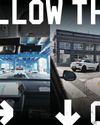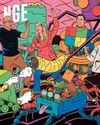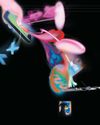
A fleet of robot ships bobs gently in the warm waters of the Persian Gulf, somewhere between Bahrain and Qatar, maybe 100 miles off the coast of Iran. I am on the nearby deck of a US Coast Guard speedboat, squinting off what I understand is the port side. On this morning in early December 2022, the horizon is dotted with oil tankers and cargo ships and tiny fishing dhows, all shimmering in the heat. As the speedboat zips around the robot fleet, I long for a parasol, or even a cloud.
The robots do not share my pathetic human need for shade, nor do they require any other biological amenities. This is evident in their design. A few resemble typical patrol boats like the one I'm on, but most are smaller, leaner, lower to the water. One looks like a solar-powered kayak. Another looks like a surfboard with a metal sail. Yet another reminds me of a Google Street View car on pontoons.
These machines have mustered here for an exercise run by Task Force 59, a group within the US Navy's Fifth Fleet. Its focus is robotics and artificial intelligence, two rapidly evolving technologies shaping the future of war. Task Force 59's mission is to swiftly integrate them into naval operations, which it does by acquiring the latest off-the-shelf tech from private contractors and putting the pieces together into a coherent whole. The exercise in the Gulf has brought together more than a dozen uncrewed platforms-surface vessels, submersibles, aerial drones. They are to be Task Force 59's distributed eyes and ears: They will watch the ocean's surface with cameras and radar, listen beneath the water with hydrophones, and run the data they collect through pattern-matching algorithms that sort the oil tankers from the smugglers.
هذه القصة مأخوذة من طبعة September 2023 من WIRED.
ابدأ النسخة التجريبية المجانية من Magzter GOLD لمدة 7 أيام للوصول إلى آلاف القصص المتميزة المنسقة وأكثر من 9,000 مجلة وصحيفة.
بالفعل مشترك ? تسجيل الدخول
هذه القصة مأخوذة من طبعة September 2023 من WIRED.
ابدأ النسخة التجريبية المجانية من Magzter GOLD لمدة 7 أيام للوصول إلى آلاف القصص المتميزة المنسقة وأكثر من 9,000 مجلة وصحيفة.
بالفعل مشترك? تسجيل الدخول

MOVE SLOWLY AND BUILD THINGS
EVERYTHING DEPENDS ON MICROCHIPS-WHICH MEANS TOO MUCH DEPENDS ON TAIWAN. TO REBUILD CHIP MANUFACTURING AT HOME, THE U.S. IS BETTING BIG ON AN AGING TECH GIANT. BUT AS MONEY AND COLOSSAL INFRASTRUCTURE FLOW INTO OHIO, DOES TOO MUCH DEPEND ON INTEL?

FOLLOW THAT CAR
CHASING A ROBOTAXI FOR HOURS AND HOURS IS WEIRD AND REVELATORY, AND BORING, AND JEALOUSY-INDUCING. BUT THE DRIVERLESS WORLD IS COMING FOR ALL OF US. SO GET IN AND BUCKLE UP.

REVENGE OF THE SOFTIES
FOR YEARS, PEOPLE COUNTED MICROSOFT OUT. THEN SATYA NADELLA TOOK CONTROL. AS THE COMPANY TURNS 50, IT'S MORE RELEVANT-AND SCARIER-THAN EVER.

THE NEW COLD WARRIOR
CHINA IS RACING TO UNSEAT THE UNITED STATES AS THE WORLD'S TECHNOLOGICAL SUPERPOWER

CALIFORNIA DREAMIN'
KINDRED MOTORWORKS VW BUS - Despite being German, the VW T1 Microbus is as Californian as the Grateful Dead.

THE INSIDE SCOOP ON DESSERT TECH
A lab in Denmark works to make the perfect ice cream. Bring on the fava beans?

CONFESSIONS OF A HINGE POWER DATER
BY HIS OWN estimation, JB averages about three dates a week. \"It's gonna sound wild,\" he confesses, \"but I've probably been on close to 200 dates in the last year and a half.\"

THE WATCHFUL INTELLIGENCE OF TIM COOK
APPLE INTELLIGENCE IS NOT A PLAY ON \"AI,\" THE CEO INSISTS. BUT IT IS HIS PLAY FOR RELEVANCE IN ALL AREAS, FROM EMAIL AUTO-COMPLETES TO APPS THAT SAVE LIVES.

COPYCATS (AND DOGS)
Nine years ago, a pair of freshly weaned British longhair kittens boarded a private plane in Virginia and flew to their new home in Europe.

STAR POWER
The spirit of Silicon Valley lives onat this nuclear fusion facility's insane, top-secret opening ceremony.